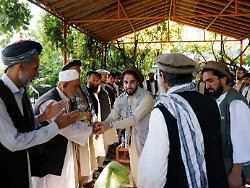Tuesday, August 24, 2021
Well-known name, hardly any allies
Can Massoud stand up to the Taliban?
In the Afghan Pandjir Valley, the son of a legendary Taliban opponent tries to organize resistance against the Islamists. But observers have doubts whether Ahmad Massoud can really fill in the footsteps of his famous father.
Ahmad Massoud seems very busy. Unfortunately, the 32-year-old Afghan is indispensable at the moment, he is visiting several checkpoints in the Punjir Valley, his secretary Asis Akhmad explains on the phone. His assistant Fahim Dashti also thinks it is understandable that the man who wants to head the National Resistance Front against the Taliban has “many things” on his mind. But one thing, Dashti continues, he knows for sure: “Massoud is in a good mood.”
This is actually remarkable given that the Taliban have encircled the small province of Punjir in northeast Kabul. It is the last bastion in the country that the Taliban have not yet captured. Since the Islamists came to power about a week ago, talks have been going on between the Taliban and representatives of the province, which had already put up bitter resistance against the Islamists in the 1990s and could not be captured by them.
The Islamists recently stated that other forces had taken up positions around the Punjir. Many are now looking excitedly at Pandjir with its steep mountains and narrow valleys. So excited that in the past few days there have been rash reports that there is already a fight. Not at all, says Massoud’s assistant Daschti. “The Taliban neither attacked us nor did we attack the Taliban.”
Preparations for a possible armed conflict are ongoing. Videos recently surfaced on social media showing convoys of vehicles with gunmen in the valley. Ahmad Massoud wants to lead the resistance there. He is the son of Ahmad Shah Massoud, better known as the “Lion of Pandjir”, and now that the Taliban have taken power in Afghanistan, he apparently wants to follow in his father’s footsteps. He had put up bitter resistance against the Taliban in the 1990s until he was killed in a suicide bombing two days before September 11, 2001.
“These are more like attempts at resistance”
“Our priorities are peace and negotiations,” says Dashti. But if the Taliban rely on military means and violence, “then another period of war begins in Afghanistan”. Dashti does not want to say how strong the resistance so far is. Just this much: Many people from other provinces of the country are already in the province – civilians as well as military. Indeed, on the chaotic day of the fall of Kabul in the middle of the month, there were reports that numerous security forces had driven down into the valley with their equipment, including allegedly one and a half battalions of special forces. In the weeks before that, the Punjiris had already brought countless weapons, ammunition and other war equipment there. They are also said to have stocked up on food supplies.
Massoud’s assistant Dashti says the forces in Pandjir are ready not only to defend the province and other areas in the country, but also to defend all of Afghanistan’s values. How far they get with it is unclear. Observers say the young Massoud has a prominent name but few allies. In addition, no one knows of any country that has promised him support.
It is also unclear whether there is now great willingness in the country to resume a war after it finally appears to be over. This also applies to those who are not satisfied with the victory. For Thomas Ruttig from the Afghanistan Analysts Network think tank, it is still too early to speak of any resistance at all. “These are more like attempts at resistance,” he says. They appeared to be scattered and not uniform. This has to do not least with the notorious fragmentation of the Northern Alliance. “Many people claim the legacy of Ahmad Shah Massoud”. It is doubtful that the young Massoud will develop into a figure of unity – his attempts so far have not been crowned with great success.
There is only one road into the Pandschir Valley, says the former German diplomat and Afghanistan expert Gunter Mulack. “A resistance movement can form. Even the Soviets never managed to penetrate the Pandjir Valley.” But resistance to the Taliban also means civil war, according to the director of the German Orient Institute. “I am sure that the majority of Afghans do not want that. If need be, they will accept the Taliban if only peace and quiet are assured and the Taliban keep their promises regarding women, work, amnesty, schools and so on. “
One should not forget that the Pandschiri faction of the Northern Alliance with its rabid power politics was one of the initiators of the conflicts in the country after the US invasion in 2001, says Ruttig. The Northern Alliance took blanket revenge on the Pashtuns, especially in the north, for supporting the Taliban. This has attracted the Taliban. It is now known how this influx ended.
.
